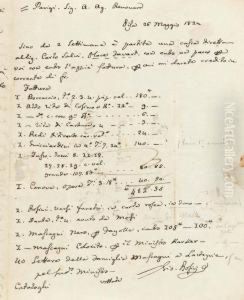Gioacchino Rossini Paintings
Gioachino Rossini was an Italian composer known for his operas that have entered the global canon of musical masterpieces. Born on February 29, 1792, in Pesaro, Papal States (now Italy), Rossini was introduced to music at a very young age. His mother was a singer and his father a horn player and trumpet player, which undoubtedly influenced Rossini's early and profound engagement with music. Despite some tumult in his family life, including his father's imprisonment and his mother's career in opera that led to financial instability, Rossini pursued his passion for music with remarkable vigor and determination.
Rossini's education in music began in earnest when he enrolled at the Liceo Musicale in Bologna in 1806, focusing on cello playing and composition. His early works garnered attention, but it was his opera 'La cambiale di matrimonio', premiered in 1810, that established him as a rising star in the operatic scene. What followed was a prolific period during which Rossini composed some of his most famous operas, including 'Il barbiere di Siviglia' (The Barber of Seville, 1816), 'La Cenerentola' (Cinderella, 1817), and 'Guillaume Tell' (William Tell, 1829). These works are celebrated for their innovative use of orchestration, their dynamic use of vocal lines, and their comedic elements, particularly in 'Il barbiere di Siviglia', which remains one of the most performed operas worldwide.
Rossini's career was not without its challenges. He faced competition from contemporaries, fluctuating popularity, and the pressures of a demanding production schedule. Despite these obstacles, Rossini's influence on the development of Italian opera and his contribution to the bel canto style were profound. After a period of intense activity, Rossini largely withdrew from composition after 1829, with the premiere of 'Guillaume Tell', his last major opera. He spent much of the latter half of his life in Paris, where he became a central figure in the city's cultural life, hosting salons that attracted some of the leading artists and intellectuals of the time.
Rossini died on November 13, 1868, in Passy, near Paris, leaving behind a legacy that has endured in the opera world and beyond. His ability to infuse his music with both technical mastery and emotional depth has made his works timeless. In addition to his operas, Rossini also composed sacred music, chamber music, songs, and some instrumental and piano works, showcasing his versatility as a composer. His influence is evident in the works of later composers, including Giuseppe Verdi and Richard Wagner, who admired Rossini's innovative approach to opera. Rossini's life and work continue to be celebrated for their significant contributions to the development of musical art.
